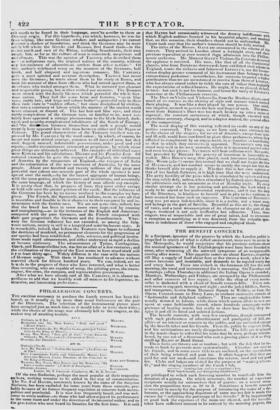PHILHARMONIC CONCERTS.
THE exertion necessary to produce the fourth concert has been fol- lowed, as it usually is, by more than usual listlessness on the part of the Directors. The selection of the instrumental pieces must have occupied just as much time as it would take to write their titles ; while the choice of the songs was obviously left to the singers, as the easiest way of avoiding trouble.
ACT I.
Sinfonia, in E flat MOZART. Recitative and Air. Miss Disco, " Doty and great " (Amor Si) NEUKONIS1.
•
Coneerto Violoncello. Sir. Mom trz Ganz, principal Vklon-
Ce1:0 to the King of Prussia M. GANZ. Soma. Mrs. W000, " Non pii eli Sod," Come Babsetto Oblignto, Mr. Wil.1.M kW (La etroienza di Tito) MOZART. Oterture, Der Freischutr. WEBER.
ACT U.
Sinfonia (S0.3) HAYDN. Ac,. Mr. it KNNETT, " S'altro cite laeriine "(La Cletntoza
di Tito) MozAtur.
DoK l'oneertatite. Violin toul hisser'. 1.1.2u- SoLn and MORITZ GANz, Director:, of the Con, erts to the King of Prussia GANz AND HOUSER, Terzetto, Mrs. WOOD, Miss BIRCH, and Mr. Hi NNETT,
o moire amnia," (It notto di Proserpina) Overture. Leonora Iii t..TitovEN.
Lender, Mr, F. CRAmER—Colidnctor, Mr. H. It. 111$110P.
Of the two Sinfonias, perhaps the most popular of their respective aultors, nothing remains to be added in the way of commendation. The No. 3 of HAYDN, commonly known by the name of the Surprise Sinfonia, has been excluded for some years from these concerts, pro- bably because of its former frequent repetition at concerts both metro- politan and provincial. It is now less frequently heard, and was wel- come to every auditor—to those who had often enjoyed its performance M the same room and tinder the direction of its immortal author, and to the gent ration who now heard its beauties for the first time. It is said that HAYDN bad occasionally witnessed the drowsy indiffere: wt ihetilir which English auditors listened to his beautiful adagios, eartedocirkisoul.ii,sedd. their, on this occasion, their slumbers should not be undisturbed. It CHIPP took care that the author's intention should be fully realized r. The titles of the Messrs. GANZ are announced in the scheme of the concert. They anived in London about a fortnight since, previous reputation at once secured theom .admission into the Philhat monic orchestra. Mr. AIonlyz GANZ'S Violoncello Comte the applause it received. His tone, like that of all the Continental players, who from ROMBERG downwards have exhibited their talents in England, wants the richness and fulness of LINDLEY'S, nor did hisexe- centre display greater command of his instrument than belongs to that extraordinary performer nevertheless, his .concerto imparted a higher pleased, detest, gratification than we are accustomed to receive from those of LINDLEY who has always aimed rather to tickle the ears of veleta than to gratify' the expectations of refined hearers. Ile might, if he so in tun] : but such is not leis 'mincer, amid hence the rarity of LINDLEY'S concertos et the Philhai motile COnCel Is.
The Duet on Violin Enid Violoncello, from the Brothers GeNz,owee much of its success to the identity of style and manner whieh marked their playing. It was like a duet played by one person. One mind one impulse, seemed to govern the bow and finger of each. The move: ment from Bointea's Duet was too much broken up into a series of capriccii the constant occurrence of which, though executed with murvellous accunicy, changed, and in u degree marred, the general effect of the composition. The vend display of this evening reflected no credit on any of the parties concerned. The songs, US we have said, were obviously left to the delve of the singers ; for no set of directors, except from spite and ihl.will, could have combined to place three performers, whom they affected to compliment by an engagement, in a situation so humiliating as that in which they successively uppeared. NEUKONN'S song may stand rely well in his on me oratorio, where ere it s measured against other and even weaker pieces : NEVKOMM will bear collision %vitt' NRetiolIM, but preceded by MozenT his poverty of invention is laineetably re. N•caled. Miss Bowles soug, thus placed, sunk into utter insignifictenee. Mrs. Woou (alas !) seems determined that we shall not forget the loss of MaLoniew, and her conduct seems to justify the suspicion that she thinks herself able to supply it. Whether this is her own opinion or that of her foolish flatterers, it is high time that she were undeceived. The petty hostility of the press which is stimulated by spleen and envy she may biddy defy, unless, when stimulated by flattery inure dangerous, she adventures such an encounter us that of Monday night. By every similar attempt she is but pointing and poisoning the barb which is ready to be aimed at her professional reputation ; and it was the duty of the Directors, in kindness to herself and in pity to her auditors, to have rescued her from such an exposure. The insertion of BENNEII'S song wits yet more indefensible, since it is a treble, not it tenor song, and belongs to the part of Servilia. Beautiful as this air is, the change of voice, toed a total misconception of its charucter on the part of the singer, rendered it not ouly ineffective but offensive. Thus, three singers, two of respectable and one of great talent, had to encounter at reception as mortifying as it was deserved, from the culpable igno- rance or indolence of those who engaged and employed them.


























 Previous page
Previous page